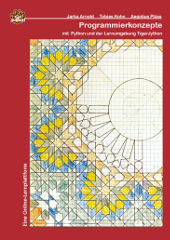Ziffernkürzbare Zahlenpaare (Schleifen)
Normalerweise darf man aus Brüchen nicht einfach einzelne Ziffern kürzen. So ist 18/12 natürlich nicht gleich 8/2 (wenn ich die eins kürzen würde).
Bei einigen Zahlenpaaren funktioniert dies jedoch zufälligerweise. So ist (65/26) dasselbe wie 5/2 (einfach die Ziffer 6 im Zählen und Nenner steichen).
Schreiben Sie ein Programm, dass von allen zweistelligen Zahlenpaaren (Paare aus zwei zweistelligen Zahlen) angibt, ob die Zahl «ziffernkürzbar» ist.
0 Kommentare
7 Lösung(en)
package kuerzen; // 2019-11-25 ?
public class Kuerzen {
public static void main(String[] arg) {
new Kuerzen() . top2();
new Kuerzen() . top3();
}
int x, y, z;
void top2() {
for(x = 1; x <= 9; x++) {
for(y=1; y <=9; y++) {
for(z = 0; z <=9; z++) {
test();
}
}
}
}
void test() {
if(10*x*y+y*z == 10*y*z+x*z && x != y) {
System.out.println(""+x+z + "/" + y+x);
}
}
int s, t, u;
void top3() {
for(x = 1; x <= 9; x++) {
for(y = 0; y <= 9; y++) {
for(z = 0; z <= 9; z++) {
for(s = 1; s <= 9; s++) {
for(t = 0; t <= 9; t++) {
for(u = 0; u <= 9; u++) {
test3();
}}}}}}
}
void spucksAus3() {
System.out.println(""+x+y+z + "/" +s+t+u);
}
void test3() {
int zaehlerOrig=100*x+10*y+z;
int nennerOrig =100*s+10*t+u;
// Trivialfälle aussortieren
if(z==0 && u==0 && t==0) return;
if(u==0 && y==0 && z==0) return;
if(x==s && y==t && z==u) return;
//nur aufsteigend
if(nennerOrig<zaehlerOrig) return;
if(x==t) {
if( (10*s+u)*zaehlerOrig == (10*y+z)*nennerOrig) {
spucksAus3(); return;
}
}
if(x==u) {
if( (10*s+t)*zaehlerOrig == (10*y+z)*nennerOrig) {
spucksAus3(); return;
}
}
if(y==s) {
if( (10*t+u)*zaehlerOrig == (10*x+z)*nennerOrig) {
spucksAus3(); return;
}
}
if(y==u) {
if( (10*s+t)*zaehlerOrig == (10*x+z)*nennerOrig) {
spucksAus3(); return;
}
}if(z==s) {
if( (10*t+u)*zaehlerOrig == (10*x+y)*nennerOrig) {
spucksAus3(); return;
}
}
if(z==t) {
if( (10*s+u)*zaehlerOrig == (10*x+y)*nennerOrig) {
spucksAus3(); return;
}
}
}
}
Lösung von: Philipp G. Freimann (BBW (Berufsbildungsschule Winterthur) https://www.bbw.ch)
// Kotlin
fun main() {
for(a in 1..999) {
for(b in 1..999) {
if(a == b)
continue
isCancelable(a, b)
}
}
}
fun isCancelable(a: Int, b: Int) {
val digitsA = getDigits(a)
val digitsB = getDigits(b)
val common = digitsA intersect digitsB
cancel(a, b, digitsA, digitsB, common) {
println("${it.first.first} / ${it.first.second} = ${it.second.first} / ${it.second.second}")
}
}
fun cancel(originalA: Int, originalB: Int, a: List<Int>, b: List<Int>, common: Set<Int>, results: (Pair<Pair<Int, Int>, Pair<Int, Int>>) -> Unit) {
for(cancel in common) {
if(!a.contains(cancel) || !b.contains(cancel))
continue
if(a.size == 1 || b.size == 1)
continue
val newA = a.toMutableList().apply { remove(cancel) }
val newB = b.toMutableList().apply { remove(cancel) }
cancel(originalA, originalB, newA, newB, common, results)
val aInt = newA.joinToString(separator = "").toInt()
val bInt = newB.joinToString(separator = "").toInt()
if(aInt.toDouble() / bInt.toDouble() == originalA.toDouble() / originalB.toDouble())
results((originalA to originalB) to (aInt to bInt))
}
}
fun getDigits(x: Int): List<Int> {
val digits = mutableListOf<Int>()
var i = x
while (i > 0) {
digits.add(i % 10)
i /= 10
}
return digits.reversed()
}
Lösung von: Name nicht veröffentlicht
# Zweistellige Bruchzahlen erstellen.
for zähler in range(10,100):
for nenner in range(10,100):
# Brüche ausschliessen die sofort kürzbar sind.
if zähler != nenner and nenner % 10 != 0:
# Bruchzahlen in einzelne Ziffern trennen.
ziffern_zähler = list(divmod(zähler,10))
ziffern_nenner = list(divmod(nenner,10))
# Gleiche Ziffern Streichen.
for z in ziffern_zähler:
for n in ziffern_nenner:
if z == n :
ziffern_zähler.remove(z); z1 = ziffern_zähler[0]
ziffern_nenner.remove(n); n1 = ziffern_nenner[0]
# Brüche ausgeben bei denen der Bruchwert erhalten bleibt.
if z1/n1 == zähler/nenner:
print(z1,'/',n1,' enspricht ',zähler,'/',nenner)
Lösung von: Alex Groeg (Freies Lernen)
using System;
using System.Linq;
namespace Kürzen
{
class Program
{
static void Main(string[] args)
{
//Durchlauf für alle Zähler und Nenner von 10 bis 99
for(int z = 10; z < 100; z++)
{
for(int n = 10; n < 100; n++)
{
if (kürzbar(z, n))
Console.WriteLine($"{z}/{n}");
}
}
Console.ReadLine();
}
/// <summary>
/// Prüft ob ein Bruch nach der Kürzung einer Ziffer immer noch das gleiche Ergebnis liefert
/// </summary>
/// <param name="zähler"></param>
/// <param name="nenner"></param>
/// <returns></returns>
private static bool kürzbar(int zähler, int nenner)
{
//Umwandeln in ein Array von Ziffern
int[] z = getZiffern(zähler);
int[] n = getZiffern(nenner);
foreach(int item in z)
{
//Schaue ob Dopplungen in Zähler und Nenner sind
if (n.Contains(item))
{
//Entfernt eine Ziffer und setzt die Zahl wieder zusammen
int z1 = combine(z.Where(x => x != item).ToArray());
int n1 = combine(n.Where(x => x != item).ToArray());
//Prüft ob die beiden Brüche übereinstimmen
if((double)z1 / n1 == (double)zähler / nenner)
return true;
}
}
//Gab es bis hier keine Übereinstummung, so wird false zurückgegeben
return false;
}
/// <summary>
/// Gibt die einzelnen Ziffern einer Zahl als Array zurück
/// </summary>
/// <param name="zahl"></param>
/// <returns></returns>
private static int[] getZiffern(int zahl)
{
//Array aus der Anzahl der Stellen einer Zahl
int[] arr = new int[zahl.ToString().Length];
//Füllen des Arrays mit den einzelnen Ziffern der Zahl
for (int i = 0; i < arr.Length; i++)
{
int wertigkeit = (int)Math.Pow(10, i + 1);
arr[i] = (zahl % wertigkeit) / (wertigkeit / 10);
zahl -= arr[i];
}
return arr.Reverse().ToArray();
}
/// <summary>
/// Setzt ein Array aus einstelligen Zahlen zu einer Zahl zusammen
/// </summary>
/// <param name="ziffern"></param>
/// <returns></returns>
private static int combine(int[] ziffern)
{
int sum = 0;
//Addiere zur Summe die Wertigkeit der einzelnen Stellen
for(int i = 0; i < ziffern.Length; i++)
{
sum += ziffern[ziffern.Length - i - 1] * (int)Math.Pow(10, i);
}
return sum;
}
}
}
Lösung von: Tobias Golz (Wilhelm Büchner Hochschule)
function isDigitReducible(a, b) {
// klare fälle, ließe sich noch ergänzen
// die trivialen fälle bleiben selbstverständlich
// erhalten, da sie die bedingung erfüllen
if (a < 10 || b < 10) return false;
if (a == b) return true;
if (a % 10 == 0 && b % 10 == 0) return true;
let den = a.toString().split(''),
div = b.toString().split('');
for (let i = 0; i < den.length; i++)
for (let j = 0; j < div.length; j++) {
if (den[i] == div[j]) { // ziffer finden
let test1 = den.slice(), test2 = div.slice(); // arrays kopieren
test1.splice(i, 1), test2.splice(j, 1); // ziffer kürzen
// check
if (parseInt(test1.join('')) / parseInt(test2.join('')) == a / b)
return true;
}
}
return false;
}
// ausgabe
function showResults(arr) {
document.write('<p>')
for (let i = 0; i < arr.length; i++)
document.write(`${arr[i].join('/')}<br>`);
document.write(`(${arr.length} Elemente)</p>`);
}
// rein zweistellige brüche
let results = [];
for (let i = 10; i <= 99; i++)
for (let j = 10; j <= 99; j++)
if (i < j) if (isDigitReducible(i, j)) results.push([i, j]);
showResults(results);
// zwei- und dreistellig gemischte brüche
results = [];
for (let i = 10; i <= 99; i++)
for (let j = 100; j <= 999; j++)
if (isDigitReducible(i, j)) results.push([i, j]);
showResults(results);
// rein dreistellige brüche
results = [];
for (let i = 100; i <= 999; i++)
for (let j = 100; j <= 999; j++)
if (i < j) if (isDigitReducible(i, j)) results.push([i, j]);
showResults(results); // lissalanda@gmx.at
Lösung von: Lisa Salander (Heidi-Klum-Gymnasium Bottrop)
for i in range(10, 100):
for j in range(10, 100):
# Zerlege die zweistelligen Zahlen in jeweils zwei einstellige Zahlen
x1 = int(str(i)[0:1])
x2 = int(str(i)[1:])
y1 = int(str(j)[0:1])
y2 = int(str(j)[1:])
if x1 == y1:
# Schließe die Nulldivision aus UND prüfe auf das gewünschte Ergebnis UND schließe gleiche Zahlen und Vielfache von 10 aus
# INFO: Entferne jeweils die letzten beiden Bedingungen (i != j and .. and ..), um gleiche Zahlen und Vielfache von 10 mit
# aufzulisten, denn auch diese entsprechen dem gewünschten Ergebnis
if x2 and y2 != 0 and x2 / y2 == i / j and i != j and i%10 != 0 and j%10 != 0:
print(str(i)+" / "+str(j)+" entspricht "+str(x2)+" / "+str(y2))
continue
if x1 == y2:
if x2 and y1 != 0 and x2 / y1 == i / j and i != j and i%10 != 0 and j%10 != 0:
print(str(i)+" / "+str(j)+" entspricht "+str(x2)+" / "+str(y1))
continue
if x2 == y1:
if x1 and y2 != 0 and x1 / y2 == i / j and i != j and i%10 != 0 and j%10 != 0:
print(str(i)+" / "+str(j)+" entspricht "+str(x1)+" / "+str(y2))
continue
if x2 == y2:
if x1 and y1 != 0 and x1 / y1 == i / j and i != j and i%10 != 0 and j%10 != 0:
print(str(i)+" / "+str(j)+" entspricht "+str(x1)+" / "+str(y1))
Lösung von: Name nicht veröffentlicht
// NET 6.x | C# 10.x | VS-2022
static (bool b, string s) IsReducible(int a, int b) {
if (a == b || a % 10 == 0 || b % 10 == 0) return (false, "keine Loesung");
var aChr = a.ToString().ToCharArray().ToList();
var bChr = b.ToString().ToCharArray().ToList();
var length = aChr.Count;
for (var i = 0; i < length; i++) {
for (var k = 0; k < length; k++)
if (aChr[i] == bChr[k]) {
aChr.RemoveAt(i);
bChr.RemoveAt(k);
goto IsMatch;
}
if (i == length - 1) return (false, "keine Loesung");
}
IsMatch:
var x = double.Parse(string.Join("", aChr));
var y = double.Parse(string.Join("", bChr));
var t = (a / (double)b) == (x / y);
return (t, t ? $"{x}/{y}" : "keine Loesung");
}
static IEnumerable<ReducibleNumber> GetReducibleNumbers(int num_first_digits, int num_second_digits, int den_digits) {
for (int i = (int)Math.Pow(10, num_first_digits-1); i <= (int)Math.Pow(10, den_digits)-1; i++)
for (int k = (int)Math.Pow(10, num_second_digits - 1); k <= (int)Math.Pow(10, den_digits) - 1; k++) {
var (b, s) = IsReducible(i, k);
if (b) yield return new(i, k, s);
}
}
static void Print(IEnumerable<ReducibleNumber> lst) => lst.ToList().ForEach(i => Console.WriteLine($"{i.Numerator}/{i.Denominator} ({i.Fraction})"));
Print(GetReducibleNumbers(2, 2, 2)); // zweistellige
Print(GetReducibleNumbers(2, 3, 3)); // zwei- und dreistellige gemischt
Print(GetReducibleNumbers(3, 3, 3)); // dreistellige
Print(GetReducibleNumbers(4, 4, 4)); // vierstellige (dauert aber!)
Console.WriteLine(IsReducible(15, 17)); // Einzelaufruf
record struct ReducibleNumber(int Numerator, int Denominator, string Fraction);
Lösung von: Jens Kelm (@JKooP)
Verifikation/Checksumme:
Zweistellig:
16/64
26/65
19/95
49/98
Dreistellig:
106/265
112/616
116/464
119/595
121/220
130/325
132/330
133/532
133/931
134/335
136/340
138/345
139/695
143/440
146/365
149/298
149/596
149/894
154/550
159/795
160/640
161/644
162/648
163/652
164/656
165/660
166/664
167/668
168/672
169/676
176/770
179/895
183/732
186/465
187/880
190/950
191/955
192/960
193/965
194/970
195/975
196/980
197/985
198/990
199/398
199/597
199/796
199/995
216/864
217/775
224/728
226/565
231/330
233/932
238/340
242/440
249/498
249/996
253/550
260/650
262/655
264/660
266/665
268/670
270/756
275/770
286/880
291/970
294/980
297/990
299/598
299/897
305/854
306/765
332/830
334/835
335/536
335/737
335/938
341/440
346/865
349/698
352/550
363/660
374/770
385/880
386/965
390/975
392/980
394/985
396/990
398/995
399/798
427/976
449/898
451/550
462/660
469/670
473/770
484/880
490/980
491/982
492/984
493/986
494/988
495/990
496/992
497/994
498/996
499/998
561/660
572/770
583/880
591/985
594/990
597/995
671/770
682/880
693/990
781/880
792/990
796/995
891/990
Aktionen
Neue Lösung hinzufügen
Bewertung
Durchschnittliche Bewertung:
Meta
| Zeit: | 1 |
| Schwierigkeit: | Mittel |
| Webcode: | 4tmw-rpud |
| Autor: | Philipp G. Freimann (BBW (Berufsbildungsschule Winterthur) https://www.bbw.ch) |




